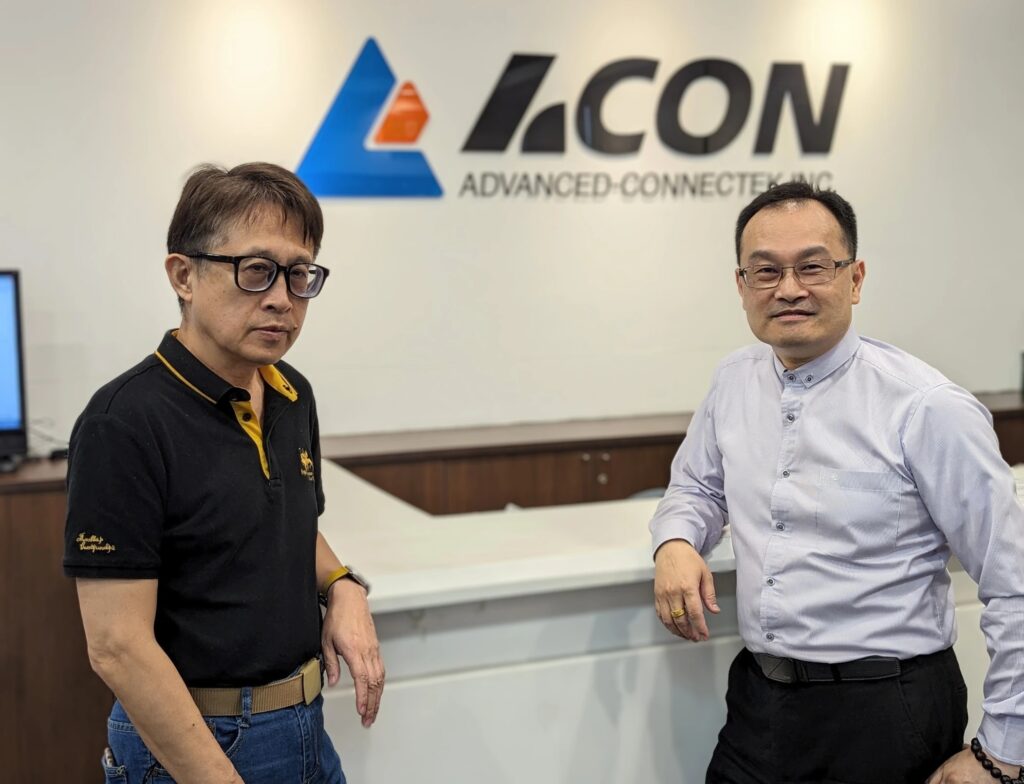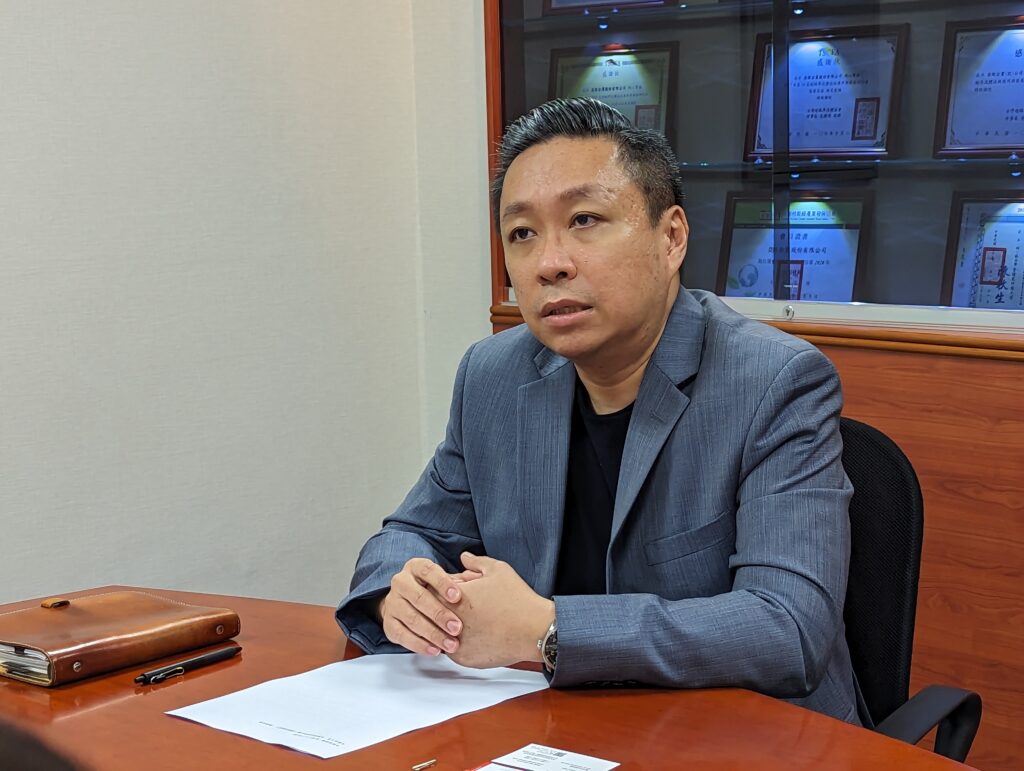
Founded in 2003, Chyi Ding Technology specializes in advanced temperature control and AMC (Airborne Molecular Contaminants) removal technologies, serving semiconductor precision environment control and energy-saving engineering sectors. With a robust R&D team, Chyi Ding has garnered numerous accolades, including the Taiwan Excellence Award and MOEA’s SME Innovation Research Award, totaling 33 awards. Its clientele includes the world’s top semiconductor manufacturers and packaging and testing facilities, with customers spread across Taiwan, the US, Germany, Switzerland, Japan, Korea, and Singapore.
“We’ve always been at the forefront of precision temperature control, and in many areas, we’re even regarded as world leaders. However, to push our technology even further, external support is essential,” explains Nicholas Su, Special Assistant to the Chairman and Acting Spokesperson of Chyi Ding Technology. Currently, Chyi Ding is primarily focused on precision temperature control for semiconductor manufacturers and packaging and testing facilities, particularly for exposure and coating machines. As semiconductor manufacturers produce ever-smaller chips, demand for high-precision temperature control equipment from these companies will continue to grow.
Pursuing Advanced R&D: Deciding to Implement AI
“The more precise the manufacturing process, the more critical temperature control becomes,” explains Su. He offers a simple comparison: a strand of hair is about 50,000 nanometers in diameter, whereas TSMC’s current chips are manufactured at just three nanometers. In such an environment, even the slightest change in temperature or humidity can cause thermal expansion or contraction, compromising the wafer yield.
Given that Chyi Ding’s clients are globally recognized semiconductor and packaging/testing giants with stringent requirements, the company continuously seeks breakthroughs and innovations in R&D. “Our competitors are all foreign companies, primarily from Japan,” Su says. As the first and only company in Taiwan to domestically manufacture precision temperature control equipment, Chyi Ding began exploring the potential of AI three years ago as a way to refine their technology and meet the high standards expected by clients.
Su recalls venturing into an entirely new field: “At that time, no one in the company had any experience with AI!” To familiarize himself, Su began experimenting with ChatGPT, initially using it to resolve some legal queries. Eventually, he encouraged colleagues to use ChatGPT to tackle work-related challenges, noticing a significant boost in their productivity. This discovery led him to seriously consider the potential of AI to enhance R&D capabilities at Chyi Ding.
7 Days to Solve a Year-long Roadblock: Profet AI AutoML Significantly Boosts R&D Efficiency
In early October 2023, after evaluating several AI platforms, Chyi Ding decided to implement Profet AI’s AutoML platform. For them, the main goal was to shorten the timeline for R&D advancements and identify overlooked aspects of their research—a task Profet AI’s AutoML platform was well-suited to address.
Nicholas Su explains with an example from their precision temperature control project. They had been working on a research initiative for two years to improve their equipment’s temperature control from ±0.01°C to ±0.001°C. While this adjustment might seem minor, adding an extra decimal point required a whole new level of precision, which had stalled the team for over a year.
He elaborates that precision temperature control is a highly challenging field. Any minor change in airflow or refrigerant flow causes fluctuations in the system’s parameters. “Our team kept hitting a ‘wall,’” Su recalls. “Every time we adjusted one parameter, another would shift, making it impossible to reach the target value.”
The turning point came when the R&D team input all parameters into Profet AI’s platform for analysis. They discovered that some parameters, previously thought to be crucial, were actually insignificant. By identifying key factors and simulating an AI model, the team achieved the ±0.001°C precision within a week. Profet AI’s platform dramatically boosted the R&D team’s efficiency, helping them overcome a year-long hurdle in just seven days.
Profet AI Workshops Facilitate AI Implementation and Streamline Training
Profet AI’s platform was selected primarily due to its user-friendly design and extensive track record. Nicholas Su noted that many of Profet AI’s existing clients overlap with Chyi Ding’s, indicating that Profet AI not only possesses deep industry knowledge but also understands the unique pain points and challenges of semiconductor companies.
In the initial phase of implementing Profet AI, a series of AI workshops were conducted, where professional consultants guided Chyi Ding’s employees in data organization, data application on the AI platform, and selecting suitable models to deploy AI projects across various departments. Su highlighted that many participants in this first round of workshops were not engineers but came mainly from business backgrounds, such as HR and marketing. Yet, by the end of the sessions, these employees had become proficient in using Profet AI’s platform—a remarkable transformation.
Looking ahead, Chyi Ding aims to leverage Profet AI’s tools and methodologies to digitize the expertise of senior employees across departments. By doing so, they hope to significantly reduce the training time for new hires. Instead of learning every step from scratch, new employees can start from an advanced point, allowing them to build on existing, systematized knowledge from the get-go.
Secure Implementation of Profet AI with No Data Leakage
With multiple research and development patents, Chyi Ding initially had concerns about potential data leakage of its proprietary technology when adopting AI. Nicholas Su explained that Chyi Ding, as an R&D-focused company, has around 60 design and research personnel, representing a quarter of its workforce. Given that many of the company’s technologies are self-developed, Chyi Ding places great importance on the management of patents and trade secrets, recently achieving Taiwan’s TIPS A-level certification for intellectual property management.
However, Su noted that not all technologies or know-how are suitable for patent applications, which heightened concerns about data security when integrating AI. To address these concerns, Profet AI tailored its implementation plan to host servers within Chyi Ding’s premises, ensuring data remains in-house. This setup allows Chyi Ding to confidently leverage the Profet AI platform, significantly enhancing R&D efficiency and empowering the company to establish a strong competitive edge globally.

